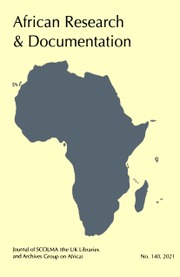Article contents
Making Marmalade and Imperial Mentalities: the case of a Colonial wife
Published online by Cambridge University Press: 25 April 2022
Extract
Miriam Cheales was born in Southern Rhodesia on the 28th October 1914 at Lincoln Farm in Beatrice, just south of Salisbury to Alan and Irene Cheales. They returned to England to deal with family business in the early 1920s and Miriam was brought up in rural Lincolnshire. After completing her education she undertook some training in basic physiotherapy, and served as a nurse during World War Two. In September 1945 Miriam married Frank Staunton. As Frank was also originally from Rhodesia, with his family farming substantial amounts of land they decided to return to Africa and Frank took a post as a native commissioner. Upon arrival in Southern Rhodesia, Staunton was both adjusting to married life and finding herself back at “home” despite the fact she rarely thought of herself as Rhodesian.
- Type
- Articles
- Information
- Copyright
- Copyright © International African Institute 2010
References
Notes
2 Kirkwood, Deborah, (1984), ‘Settler wives in Southern Rhodesia: a case study’ in Callan, H. and Ardener, S (eds)., The Incorporated Wife, London: Croom Helm, p. 159.Google Scholar
3 Papers of Miriam Staunton, Rhodes House Library, Oxford (hereafter RHL) Mss. Afr.s.2398, Staunton's notes about her work in the FAWC n.d.
4 RHL Mss. Afr.s.2398, Letter Dated 10th March n.y.
5 See Cain, Peter and Hopkins, Anthony (2001), British Imperialism 1688-2000, Harlow: Longman.Google Scholar
6 RHL Mss. Afr.r.273, Frank Staunton., A Life in the Native Department 1934- 1971, (Harare, 1991), p. 62.
7 RHL Mss. Afr.s.2398, Letter Dated 13th November n.y.
8 Carolyn, Martin-Shaw (2008), ‘Sticks and Scones: Black and White Women in the Homecraft Movement of Colonial Zimbabwe’, Race/Ethnicity Multidisciplinary Global Perspectives, 1 (2), pp. 253-278.Google Scholar
9 RHL Mss. Afr.s.2398, Letter Dated 22nd August 1949.
10 Ibid.
11 Sita, Ranchod-Nilsson (1992), ‘“Educating Eve“: The Women's Club Movement and political consciousness among rural African women in Southern Rhodesia, 1950-1980', in Tranberg-Hansen, K. (ed), African Encounters with Domesticity, New Brunswick: Rutgers University Press, p. 196.Google Scholar
12 West, Michael O. (2002), The Rise of An African Middle Class: Colonial Zimbabwe 1895-1965, Bloomington: Indiana University Press, p.78.CrossRefGoogle Scholar
13 RHL Mss. Afr.s.2398, Letter Dated 6th February 1962.
14 Amy, Kaler (1999), ‘Visions of Domesticity in the African Women's Homecraft Movement in Rhodesia’, Social Science History, 23, p. 270.Google Scholar
15 Ibid., p. 279.
16 Ibid., p. 279.
17 RHL Mss. Afr.s.2398, Letter Dated 12th April 1961.
18 RHL Mss. Afr.s.2398, Letter Dated, July 21 1962.
19 RHL Mss. Afr.s.2398, Letter Dated 22nd Aug 1949.
20 RHL Mss. Afr.s.2398 Letter Dated n.d April 1953
21 See for instance Hancock, Ian, (1984), White Liberals Moderates and Radicals in Rhodesia 1953-1980, London: Croom Helm.Google Scholar
22 RHL Mss. Afr.s.2398, Letter Dated 10th March n.y
23 RHL Mss. Afr.s.2398, Letter Dated 1st May 1964.
24 RHL Mss. Afr.s.2398, Letter Dated 23rd January 1966.
25 See Antoinette, Burton (2003), Dwelling in the Archive, Women Writing House, Home and History in Late Colonial India, New York: Oxford University Press.Google Scholar
26 Antoinette, Burton (2001), ‘Thinking Beyond Boundaries: Empire Feminism and the Domains of History’, Social History, 26, pp 67-8.Google Scholar
27 Antoinette, Burton (2003), Dwelling in the Archive, pp.4-5.Google Scholar
28 RHL Mss. Afr.s.2398, Letter Dated 10th March 1953.
- 1
- Cited by




